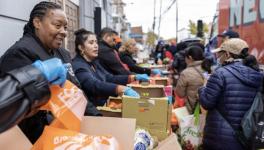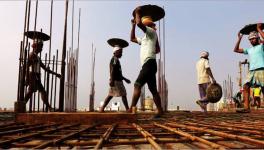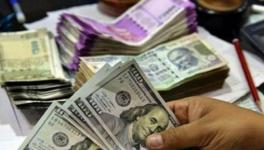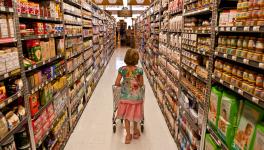In Mumbai, Lower Middle Class and Poor Suffer Worst from Inflation
Ankita Gosavi is a vegetable vendor at Parel, Mumbai. She lives in a small 15x10 chawl in Shivadi with her husband and two children. She buys vegetables from the Byculla market everyday and sells them in Parel. However, her business has been suffering for last two months.
"People are not buying vegetables like earlier. They say the price is higher. So, I don't have much profit. I am earning just Rs 6-7,000 per month since May. It is tough to manage my home now," Ankita told NewsClick.
Soaring inflation in the country and in Maharashtra has not left anyone untouched, with the brunt being borne by the middle class and poor households.
The following table lists a few vegetable whose market rates are sky high.
(Source: Byculla vegetable market)
Highlighting the sky high prices of the vegetables in Mumbai, Ankita, herself a vegetable vendor, said that she is unable to afford vegetables several days a week for her home.
Sudhakar Prabhudesai, a 72-year-old resident of Parle's Hanuman Nagar, is a pensioner. He is a retired clerk formerly working with the Maharashtra Secretariat. He gets a monthly pension of Rs 25,000. However, inflation has not spared Prabdhudesai, who can be considered to be belonging to the middle class.
He said, “I am not suffering like the poor, I accept. But the higher rates of items are severe for us pensioners too. Look at edible oil. It has reached Rs 190 (per litre). The price of milk has also gone up, along with vegetables, sugar and so on. I feel that we will soon not be able to afford these items if their price keeps increasing like now.”
Also watch: Inflation Shocker: High Prices Could Hamper Recovery
The main reason behind the rise in prices of daily items can be accounted by the hike in prices of petrol and diesel. For example, a truck carrying vegetables from Nasik requires diesel worth at least Rs 700 more to reach Mumbai than some four months ago. Obviously, the rates of goods it carries have also increased.
"Hike in diesel rates is mainly affecting everything. Transport cost is going up. So, smaller vendors and shopkeepers are also increasing rates of their goods. It is an obvious effect," said Vilas Bhujbal, chairman of Chhatrapati Shivaji Maharaj Market Yard Pune Agents’ Association.
The rates of pulses have also witnessed a hike like vegetables, making it unaffordable for the poor and lower middle class. Here are the rates of four most used pulses at Nahi Mumbai's APMC.
Irfan Sheikh drives an auto and stays in Kalyan West in Mumbai. He has six members in his family. His wife does household works in the neighbourhood. Irfan earns Rs 300 per day, i.e., around Rs 9,000 per month. "Looking after the needs of family is not easy in this income. I am somehow managing. Many times, we do not eat vegetables for three/four days. Eggs are the only non-vegetarian item we can afford. We are unable to eat chicken or mutton anymore. This is really killing us," said Irfan.
The hike in petroleum products is not the only reason behind inflation. The COVID-19 induced lockdown too has added into situation. The closure in multiple cities have hiked the rates of essential commodities, a fact accepted by even officers in the state's Marketing Department.
Also read: The Great Petro Robbery
"Lockdown (due to the pandemic) has its impact on the situation. You can see that there is disproportionate hike in retail and wholesale market. It is because of lockdown, many cities have restrictions in opening. So local market rates are changing accordingly," said Sunil Singatkar, deputy secretary of Vashi vegetables market.
Mumbai's fish market too has been affected by inflation. The rates of fish have increased in the wholesale market at Mazgaon dock. Due to the lockdown, the markets are largely closed. Fish are mainly coming from Gujarat, adding to the transport costs.
The following table shows the rates of fish in the wholesale market as opposed to earlier.
Saroj Salunkhe is a 40-year-old housewife whose husband works in a private company as helper. She lives in Koparkhairane, Navi Mumbai. She told NewsClick that she does not feel like going to the market any more. “Price of everything has increased. From vegetables to grocery to milk to fish. We are spending all of his salary. There are no savings. The government should do something at the earliest, otherwise people will soon have to start selling their belongings in order to survive," she added.
While the poor and even the middle class are feeling the burn of the soaring price hike, the national and mainstream media has so far kept mum on the situation. However, if the government does not take any steps to reign in the fuel price hike, the situation may only worsen.
Get the latest reports & analysis with people's perspective on Protests, movements & deep analytical videos, discussions of the current affairs in your Telegram app. Subscribe to NewsClick's Telegram channel & get Real-Time updates on stories, as they get published on our website.























